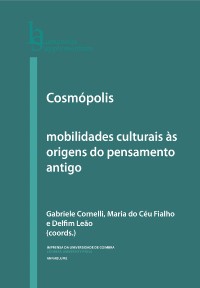Please use this identifier to cite or link to this item:
https://hdl.handle.net/10316.2/40848| DC Field | Value | Language |
|---|---|---|
| dc.contributor.author | Motta, Guilherme Domingues da | |
| dc.date.accessioned | 2016-12-27T15:36:28Z | |
| dc.date.accessioned | 2020-09-08T13:39:21Z | - |
| dc.date.available | 2016-12-27T15:36:28Z | |
| dc.date.available | 2020-09-08T13:39:21Z | - |
| dc.date.issued | 2016 | - |
| dc.identifier.isbn | 978-989-26-1287-4 | |
| dc.identifier.isbn | 978-989-26-1288-1 (PDF) | |
| dc.identifier.uri | https://hdl.handle.net/10316.2/40848 | - |
| dc.description.abstract | In order to understand the Socrates of Plato’s Dialogues as someone moved by eros one must recognize two dimensions of this character: firstly, that he is a man who has experienced a conversion which has turned him into a lover of the highest form of knowledge; secondly, that he is a man who by this conversion became, as the Symposium puts it, “fruitful in the soul”, i.e., someone who feels the urgent need to communicate his knowledge once he has found the right receptacle. Being “fruitful in the soul” represents, in the largest part of the Symposium, a person who is able to lead young men to the acquisition of civic virtue, engaging in pederastic relationships with them; being so, Socrates too establishes pederastic relations with young men, but one of a very special kind. On the one hand, he is “pregnant” with “epistemic virtue” and feels the need to pass it on. On the other hand, he is not interested in the body of young men, nor is he expecting sexual favours in return. A unitary interpretation of Socrates’ character through the Dialogues will show that He is not driven by sexual attraction for the young men he longs to guide, as a superficial approach might suggest. | eng |
| dc.description.abstract | Compreender o Sócrates dos Diálogos platônicos como um homem animado por eros implica em reconhecer duas dimensões dessa personagem: em primeiro lugar, trata-se de um homem que passou por uma conversão, fato que o transformou num apaixonado pela mais alta forma de conhecimento; em segundo lugar, é um homem que, após tal conversão, tornou-se, como diz o Banquete, “fecundo na alma”, ou seja, alguém que experimenta urgência em transmitir seus conhecimentos quando encontra um receptáculo adequado. O “fecundo na alma” representa, em boa parte do Banquete, o homem que é capaz de guiar os jovens no caminho da aquisição da virtude cívica e que se engaja numa relação pederástica com eles, de modo que também a personagem Sócrates estabelece relações pederásticas, as quais, todavia, são de natureza singularíssima. Se, por um lado, Sócrates é “grávido” da virtude “epistêmica”, a qual vai além da virtude cívica tradicional, por outro lado, Sócrates não se interessa pelo corpo dos jovens que guia, nem deles espera favores sexuais. Uma interpretação unitária desta personagem através dos diálogos permitirá sustentar que Sócrates não é movido por atração sexual pelos jovens que guia, ainda que uma abordagem superficial de certas passagens possa sugerir o contrário. | por |
| dc.language.iso | por | - |
| dc.publisher | Imprensa da Universidade de Coimbra | por |
| dc.publisher | Annablume | por |
| dc.relation.ispartof | http://hdl.handle.net/10316.2/40836 | por |
| dc.rights | open access | - |
| dc.subject | Socrates | eng |
| dc.subject | Plato | eng |
| dc.subject | eros | eng |
| dc.subject | lover | eng |
| dc.subject | guide | eng |
| dc.subject | Sócrates | por |
| dc.subject | Platão | por |
| dc.subject | eros | por |
| dc.subject | amante | por |
| dc.subject | guia | por |
| dc.title | A figura de Sócrates como amante e guia nos Diálogos de Platão | por |
| dc.title.alternative | Socrates as lover and guide in Plato’s Dialogues | eng |
| dc.type | bookPart | por |
| uc.publication.collection | Humanitas Supplementum | por |
| uc.publication.firstPage | 47 | - |
| uc.publication.lastPage | 64 | - |
| uc.publication.location | Coimbra | por |
| dc.identifier.doi | 10.14195/978-989-26-1288-1_3 | - |
| uc.publication.digCollection | PB | por |
| uc.publication.orderno | 3 | - |
| uc.publication.area | Artes e Humanidades | por |
| uc.publication.bookTitle | Cosmópolis: mobilidades culturais às origens do pensamento antigo | - |
| uc.publication.manifest | https://dl.uc.pt/json/iiif/10316.2/40848/205239/manifest?manifest=/json/iiif/10316.2/40848/205239/manifest | - |
| uc.publication.thumbnail | https://dl.uc.pt/retrieve/11073683 | - |
| uc.publication.parentItemId | 54660 | - |
| uc.itemId | 69063 | - |
| item.grantfulltext | open | - |
| item.fulltext | With Fulltext | - |
| Appears in Collections: | Cosmópolis: mobilidades culturais às origens do pensamento antigo | |
Files in This Item:
| File | Description | Size | Format | |
|---|---|---|---|---|
| a_figura_de_socrates_como_amante.pdf | 236.48 kB | Adobe PDF |  |
Items in DSpace are protected by copyright, with all rights reserved, unless otherwise indicated.
